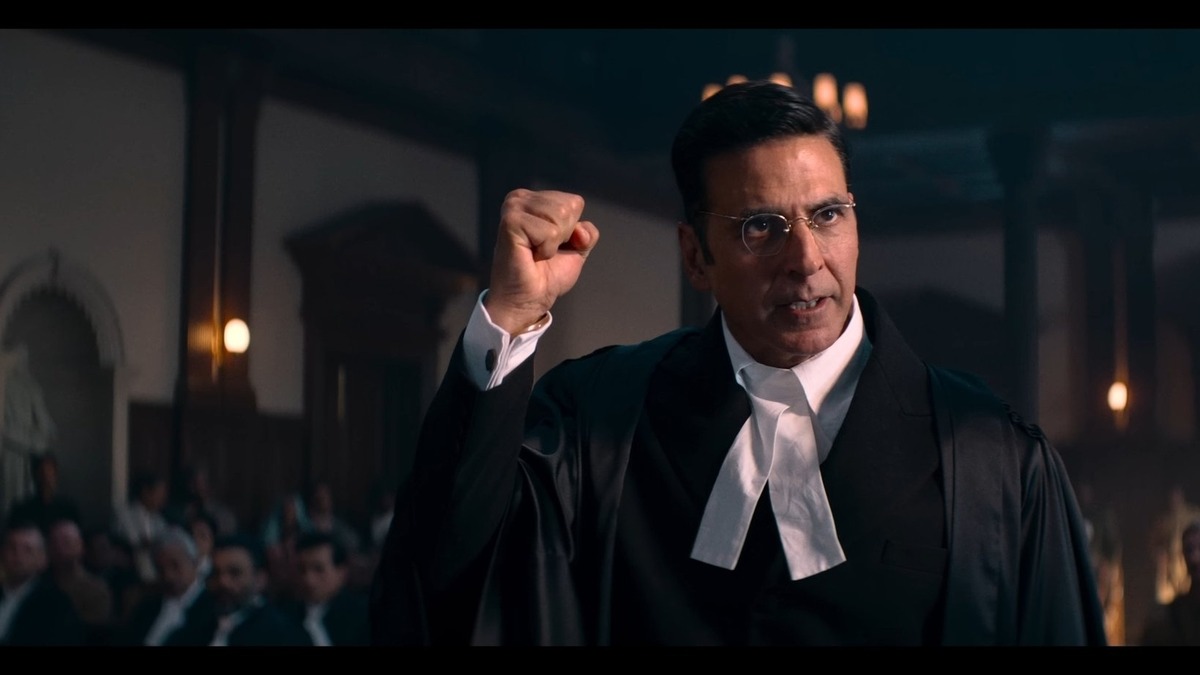'Kesari Chapter 2' review: Akshay Kumar and R Madhavan lend considerable gravitas to a passable courtroom drama

In a crucial moment in Kesari Chapter 2, Akshay Kumar's Sankaran Nair is told by a British barrister that he'll have to ditch the theatrics, unlike the last time. But, a few minutes later, Nair defies him. The film, too, is defiantly theatrical — and defiantly cinematic. This was, of course, made evident in the trailer.
So, when one goes into a film expecting it to have a fair amount of theatrical performances and cinematic moments, it then becomes a question of whether the film will deliver on the emotional front or not. There is no space for doubting whether everything shown in the film, specifically the lines and "mass" moments, happened exactly the way it is shown in the film. I, for one, do not care much for 100% historical accuracy in these films. (If you seek that, invent a time-travel machine and go see for yourself.)
Kesari Chapter 2, a "thematic sequel" to the 2019 film starring the same lead actor, has Akshay Kumar's most likeable and commanding role since Special 26. Yes, it's been that long. But did he have to don that Kathakali outfit in one scene and utter a badly pronounced Malayalam line that would trigger a snigger in Malayali audiences? (I did hear a few in the theatre. Look, Bollywood needs to stop casting Hindi-speaking actors as Malayalis, alright?) Take those two things out, and the slight awkwardness could've been eliminated.
That said, this is a film which gives Akshay enough moments to shine. When he walks into a courtroom for the first time, he is photographed from behind, at a low angle, with his cloak slo-mo flowing like a superhero's cape. But Sankaran Nair is not portrayed as a "superhero", as we'll later see. The film benefits from keeping its focus on just one episode in his life and not going for a cradle-to-the-grave biopic approach. It does not, for instance, look into his political activism. It looks more into the man behind the cloak, the one who took pleasure and pride in being validated by the British who later grows a conscience. So imagine their surprise when the man they knighted went over to the other side to fight the very people that christened him 'Sir'.
In the film, he is reminded of this title often, most notably by R Madhavan's Neville McKinley, the Anglo-Indian advocate defending General Reginald Dyer, the instigator of the Jallianwala Bagh massacre. Speaking of, the casting of Madhavan works quite well to the film's advantage owing to a certain measure of gravitas he lends to it, just like Akshay does. In the courtroom, both are showmen, in their own way. Madhavan seems to have had a lot of fun playing the character. The scenes where McKinley taunts Nair reminded me of Madhavan's character from Mani Ratnam's Guru, in which he played a man determined to expose Abhishek Bachchan's character. As in Nair's case, there is a clear motive for McKinley's decision to take on the case.
Among the interesting things about Kesari Chapter 2 is how it goes into the backstories of some of the so-called witnesses, the relevance of which is often brought up by the "bad" side, but they all have a connection, as we later learn. I'm assuming the makers took some creative liberties with these "subplots". For example, there is an explanation for why Dyer behaved like a monster on that fateful day. Did Dyer really experience something like that in his childhood?
As for Dyer's characterisation, the actor doesn't look anything like the real figure, just like every other actor in the film. At times, he appears like a cartoonish figure; in others, he evokes Hitler. In one striking optical effect, his face becomes distorted in such a way that you cannot help but think of the Führer. Ananya Pandey's performance is constrained by limited expressions, except for that one lighthearted moment involving a date where the "deadpan" delivery of a certain line works. Amit Sial is quite effective as a manipulative mediator.
Given the 'A' rating, the actors get to throw around a fair amount of f-words (let's not waste time asking whether people fired such expletives back then), and the massacre itself is depicted with a fair amount of gore (nothing more than what you saw in the trailer, though). However, if you were to ask which film did it better — Sardar Uddham Singh or Kesari 2 — I'd have to go with the Shoojit Sircar film.
Having said that, I wish the film carried more punch. Take the emotional bits, for example, and the use of music in them. Why not use an instrumental score to accompany them instead of a song? There's nothing wrong with theatricality, but in a serious film based on a horrifying real-life incident, isn't it better to dial it down a bit?
Movies Review